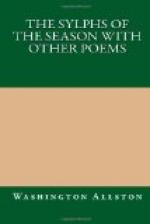“When I attempt to give the fair,
With many a speech in store,
My half-form’d words dissolve in air,
I blush and dare no more.
“And shall I then expect a smile
From Daphne on my love,
When every word and look the while
My clownish weakness prove?
“Oft at the close of summer day,
When Daphne wander’d by,
I’ve left my little flock astray,
And follow’d with a sigh.
“Yet, fearing to approach too near,
I lingered far behind:
And, lest my step should reach her ear,
I shook at every wind.
“How happy then must Colin be
Who never knew this fear,
Whose sweet address at liberty
Commands the fair-one’s ear!
“A smile, a tear, a word, a sigh,
Stand ready at his call;
In me unknown they live and die,
Who have and feel them all.”
Ah, simple swain, how little knows
The love-sick mind to scan
Those gifts which real love bestows
To mark the favoured man.
Secure, let fluent parrots feign
The musick of the dove;
’Tis only in the eye may reign
The eloquence of love.
Will, the Maniac.
A Ballad.
HARK! what wild sound is on the breeze?
’Tis Will, at evening fall
Who sings to yonder waving trees
That shade his prison wall.
Poor Will was once the gayest swain
At village dance was seen;
No freer heart of wicked stain
E’er tripp’d the moonlight
green.
His flock was all his humble pride,
A finer ne’er was shorn;
And only when a lambkin died
Had Will a cause to mourn.
But now poor William’s brain is turn’d,
He knows no more his flock;
For when I ask’d “if them he mourn’d,”
He mock’d the village clock.
No, William does not mourn his fold,
Though tenantless and drear;
Some say, a love he never told
Did crush his heart with fear.
And she, ’tis said, for whom he pin’d
Was heiress of the land,
A lovely lady, pure of mind
Of open heart and hand.
And others tell, as how he strove
To win the noble fair.
Who, scornful, jeer’d his simple love.
And left him to despair.
Will wander’d then amid the rocks
Through all the live long day,
And oft would creep where bursting shocks
Had rent the earth away.
He lov’d to delve the darksome dell
Where never pierc’d a ray,
There to the wailing night-bird tell,
‘How love was turn’d to clay.’
And oft upon yon craggy mount,
Where threatening cliffs hang high,
Have I observ’d him stop to count
With fixless stare the sky.
Footnotes
[1] In a late beautiful poem by Mr. Montgomery is the following lines “The spirits of departed hours.” The Author, fearing that so singular a coincidence of thought and language might subject him to the charge of plagiarism, thinks it necessary to state that his poem was written long before he had the pleasure of reading Mr. M.’s.




